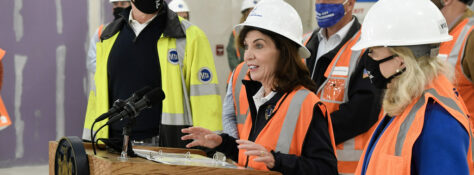As global fossil fuel emissions are the leading cause of climate change, leaders all over the world have come up with solutions to lower their region’s carbon footprint. In New York, policies have been implemented to help reduce gas emissions through transportation, industrial, and power sectors. Since the primary source of the city’s emissions comes from buildings, it is evident that building decarbonization is necessary to achieve our climate goals. One of the most critical ways to fight climate change in New York City is to electrify buildings. NYLCV therefore supports Intro 2317, a bill that would place an emissions cap on all new and renovated buildings and encourage building electrification. However, we feel that there need to be some major amendments to the bill so that we approach the complexities of building electrification pragmatically.
Learn MoreAs soon as Kathy Hochul was sworn in as Governor it became clear that she would be consciously implementing an environmentally-focused policy agenda. New York State (NYS) has some of the most ambitious goals in the country, outlined in the Climate Leadership and Community Protection Act (CLCPA), and Governor Hochul has shown that she is working to ensure that those goals are met. Now, at the three-month mark of her tenure, we review some of the exciting advancements in New York State’s fight against climate change.
Learn MoreThe deal secures an investment of $1.2 trillion, some of which will be used to fund new climate resilience projects, such as electric school buses, EV infrastructure, zero-low emission public transit, the removal of lead pipes & PFAS to improve drinking water, and pollution remediation. These investments are part of a comprehensive effort to both build resilience against the climate crisis and completely stop it in its tracks, and it marks the largest federal investment into infrastructure in U.S. history.
Learn MoreEvery day, almost 100 million plastic utensils are discarded across the United States. The cost to dispose of single-use food ware in a single year is estimated at about 1 billion dollars. Despite these shocking numbers, many restaurants still give out disposable cutlery with every take-out and delivery order. Intro 1775-B is a bill that would require food establishments to only provide non-reusable utensils, condiments, and napkins upon request. While similar bills have been successfully passed in major cities such as Los Angeles, the New York City Council has yet to even have a council hearing concerning this bill. The New York League of Conservation Voters supports the passage of Intro 1775-B to reduce the city’s residential waste.
Learn MoreNews
With power outages and flooding across the city, Hurricane Ida’s impact highlights the need for New York City to strengthen its infrastructure, especially as climate change becomes a greater threat.
Learn MoreNews
We recently co-hosted a virtual town hall with mayors from four states in the Mid-Atlantic region, including Albany Mayor Kathy Sheehan. The mayors called on Congress to pass the Build Back Better $3.5 trillion infrastructure and climate plan, highlighting the family-sustaining union jobs that would be created with a transformational investment in clean energy.
Learn MoreNews
The White House Environmental Justice Advisory Council recently released a report on recommendations to improve federal climate and environmental justice policy. As work on climate recovery legislation picks up steam in Congress, the insights in this report are more important than ever.
Learn MoreNews
The NYC Department of Sanitation will resume its program to collect residential organic waste. Residents must sign up to request the service, either through an online form or by calling 311.
Learn More





